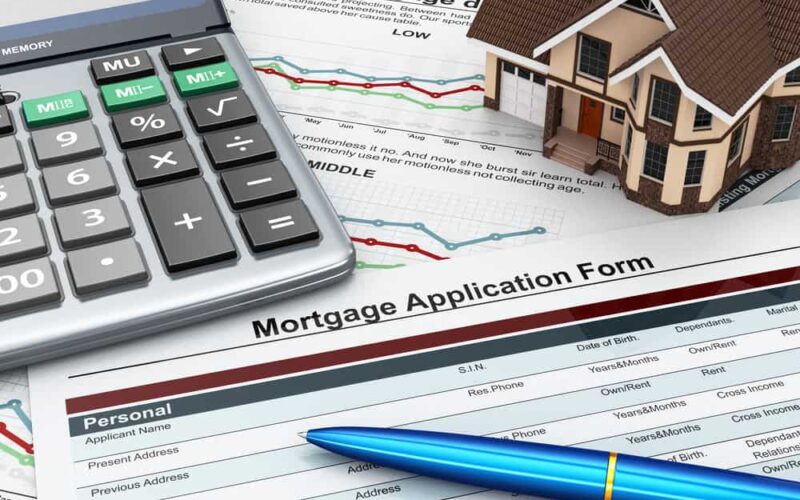According to the Federal National Mortgage Association (FNMA), the conventional financial institution that lends mortgages has been permitted to lend from four to ten. Yeah, you know what that means and I’ll be showing you how many mortgages you can have at once in your name for a rental property, and on one house.
How Many Mortgages Can You Have at Once
In as much as you may be eligible to secure many mortgages on one rental property or house. There may be some problems associated with the process of obtaining many mortgages with one rental property or a house at once. To begin with, lenders may appear warier about signing off on so many mortgages, viewing you as a higher lending risk.
You may encounter lender unwillingness to enable you to obtain more than one mortgage for rental property at the same time. It may also be necessary to submit a larger down payment, have a larger cash reserve, and have a higher credit score. When you own numerous assets, you may potentially face higher mortgage interest rates.
Qualifying for many mortgages for one rental property or a house at the same time can be difficult, but it is achievable. Continue reading to find out how to complete the task.
Being Eligible for Your First Four Mortgages
Your lender may ask you to meet specific standards if you wish to qualify for funding on your very first four or many mortgages on a house. Your lender may demand that you have the following items:
- A credit score of 670 to 739 is considered good to exceptional.
- A loan-to-value (LTV) ratio of up to 80%
- Current rental properties provide cash flow.
- W-2s or tax returns can be used as proof of income.
- The assets and liabilities statement
- Statements of financial position for any current investment properties
- Current conventional mortgage documentation
Qualification for Mortgages More Than Four
Lenders have tighter requirements when you want to get more than four or many mortgages for a rental property or one house at once.
In reality, when you seek more than four or many mortgages on one rental property, underwriting criteria get stricter. You may be required to give evidence of some if not all of the following:
- Each investment property requires a 25% down payment.
- Duplexes, triplexes, and quads are 30% less expensive.
- A minimum credit score of 720 is required.
- There have been no late mortgage payments on any property.
- Two years’ worth of tax returns demonstrating all rental income from all properties
- 6 months of cash reserves on all properties for principal, interest, taxes, and insurance (also known as PITI).
Inquire with your lender about any additional guidelines you require to finance loans five through ten.
Meeting the FNMA Qualifications for 5 – 10 Financed Properties
During the 2008 housing crisis, Fannie Mae revealed its standards for 5 – 10 financed houses for extremely competent investors. This program requires the following qualifications:
- A good credit score of 720
- A single-family home requires a 25% down payment, whereas a multifamily residence requires a 30% down payment (which could involve a two- to four-unit property)
- Have enough money to cover PITI on all properties.
- Two years’ worth of tax returns demonstrating rental income
- There have been no bankruptcies, foreclosures, or mortgage delinquencies of 30 days or more.
- There have been no late mortgage payments in the recent year, nor have there been any bankruptcies or foreclosures in the last seven years.
- A 4506-T form that has been completed for tax purposes
It is possible that you may need to search around for the best mortgage lender. Due to possible risks to the lender, not every lender will allow you the ability to tap into an FNMA 5 – 10 financed property.
Other Options for Financing Multiple Mortgages
Aside from conventional loans, as a real estate investor, you might look for alternative ways to finance many mortgages for rental property. Below, you’ll find information on private loan lenders, blanket loans, portfolio loans, and cash-out refinance loans.
#1. Private Loan Lenders
Traditional lenders do not make private loan lenders. Private loan lenders, on the other hand, are made possible by private financing from people and enterprises. Lenders frequently look for houses that will not sit on the market for long and have high resale value.
Private loan lenders are also known as safe loans. This signifies that the lender takes collateral in the form of property. Meaning that, if a debtor fails to repay a hard money loan, the lender seizes the property.
Private loan lenders do not necessitate as stringent a permitting process. If you are unable to obtain a conventional loan, you may consider this alternative as a borrower. You can also close on private loan lenders in a matter of days, as compared to the months it takes to obtain a conventional mortgage (which is about a month).
Private loan lenders frequently have high-interest rates, often ranging from 8 to 15%, as compared to the cheap rates available with a traditional loan.
#2. Blanket Loans
Blanket mortgages enable you to finance many houses under one mortgage agreement. These mortgages are ideal for commercial property owners, developers, and real estate investors. Blanket mortgages make the purchasing process more efficient and, in many cases, cheaper.
Another advantage to having a blanket mortgage is that when one of the properties in the agreement is remortgaged or sold, a clause “releases” it from the original mortgage. The other assets under the original mortgage remain under the original mortgage. Similarly, you are not expected to cover the entire amount.
When you buy a house with a blanket mortgage, you get the same financing terms for all of your properties. In return for a blanket mortgage, the lender supplies collateral for properties, similar to hard money loans. If you default on the loan, your current properties may be jeopardized.
Keep in mind that if you want to receive a blanket mortgage, you may have to meet stringent conditions. You may also not use a blanket mortgage to purchase homes in numerous states due to the differences in state laws. Lastly, a blanket mortgage has substantially greater closing expenses than a standard mortgage.
#3. Loans from a Portfolio
Rather than offering a portfolio loan on the subsequent mortgage market, a lender creates it and “keeps” it. A portfolio loan remains in the lender’s portfolio. Borrowers’ unique underwriting standards are imposed by lenders.
In terms of wait time, a portfolio loan is quite similar to a hard money loan in that it dramatically decreases the amount of time you spend waiting to secure funding for your properties.
#4. Refinancing with Cash Out
You could also want to think about a cash-out refinance. Which is a sort of mortgage refinance that draws into the equity you’ve built up in your other homes over time. When you loan more with a real estate investment. You receive a big amount of money in return for taking on a larger mortgage.
A cash-out refinance allows you to pay off your old mortgage and switch to a new one.
Alternatives for Self-Employed Business Entrepreneurs to Finance Numerous Rentals
Here are a few ideas for thinking creatively to finance numerous rental properties as your portfolio grows to ten or more houses.
A one-participant 401(k) plan can be used by self-employed business owners (k)
A one-participant 401(k), also referred to as a Solo 401(k), Solo-k, Uni-k, or a one-participant k, is an IRS-approved retirement plan. that covers a business owner with no workers or the business owner and his or her partner.
The criteria for a self-employed business owner’s retirement plan are the same as for any other 401(k) plan. However, as a company owner, you can contribute as both a worker and an owner. So, in essence, you can “double-up” on your contributions up to the given upper limits.
A one-participant 401(k) in which you call yourself the trustee achieves “checkbook control”. In the same way as an IRA that has obtained an individual member LLC and titled themselves the management does. Then, you can use your 401(k) to buy rental property (k).
Other Ways to Use an IRA to Invest in Real Estate
If you are not self-employed but have an IRA or 401(k), you can convert your current pension fund plans into a self-directed IRA with checkbook control. Or you can put your assets with a trustee who focuses on self-directed IRAs.
Nevertheless, there are a few factors to consider before investing in real estate with a one-person 401(k) or an IRA:
- The income generated by the rental property must remain in the IRA until typical distributions commence.
- You cannot obtain an indirect gain from the asset kept within the IRA. Such as serving as your own estate agent or managing the real estate through a property management firm you control.
- Real estate held in an IRA is highly regulated and must adhere to the laws in order to prevent tax penalties.
The 1031 Tax-Deferred Exchange Allows for More Investing Cash.
As they expand up and grow, most property investors adjust their rental property portfolios on a regular basis. Owners use a 1031 tax-deferred exchange to sell one investment property and acquire another. Hence, postponing the payment of any capital gains tax payable.
When performing an IRS Section 1031 tax-deferred exchange, there are precise procedures and timetables to follow. However, many investors believe that the extra effort is worthwhile, particularly when the tax savings may be leveraged to fund numerous property purchases.
Managing Several Mortgages
When you have many mortgages on a house to pay off, you should develop a decent strategy for keeping track of them all. As a matter of fact, if you choose an unconventional financing option. You may not need to depend on your lender to keep count of how much you owe. You may wish to go all the way and learn your principal amount for every property. As well as the payoff schedule and payment deadlines for each property ahead and backward.
You may not have the same lender for all of your houses, which may necessitate additional planning. It’s possible that you won’t have the same mortgage payment dates with each lender. You can choose to spread your payment dates or have them all due on the same day – whichever works best for you.
Factors to Consider
When deciding among the various choices for financing numerous rental properties. One of the most important factors to consider is what is best for you and your long-term financial goals. Consider the following factors:
- What sources of funding assist you in completing your transactions at a low cost?
- How does the timeframe in which loans are funded affect how soon transactions may be closed?
- Which mortgage choices enhance your cash flow and your rental property portfolio’s overall performance?
A Home Equity Loan: What Is It?
The amount of your home equity that you desire to mortgage is represented in cash by a home equity loan. You receive the loan as a lump sum of money to use whatever you like.
The home equity loan moves into second place. Additionally, you must make monthly payments for a set amount of time on top of your first-position loan to pay off the debt and additional interest.
How Does a Second Mortgage Operate and What Is It?
The second mortgage could be obtained from the exact same lender or a different lender. The loan from a second mortgage does not have any use restrictions, regardless of whether you obtain one from the same lender who provided your first mortgage or from a different lender.
You can do whatever you want with the money from a second mortgage, but many people use it to make repairs or cosmetic improvements to their home, which raises its resale value. You can use the home equity created by your mortgage payment to pay off large credit card balances, repair home damage, settle student loan debt, or complete other expensive financial undertakings.
Why You Are Only Permitted to Obtain Two Mortgages?
It’s challenging, if not impossible, to find a bank that will accept the third lien position for a residential property. Even if a bank or other lender decides to provide you with a loan for a third mortgage, the interest rates may be exorbitant for valid reasons, making it unlikely that you will be able to meet the requirements.
The cause is that third-position mortgages in foreclosures are paid last and perhaps not at all. It’s possible that banks won’t want to take on this kind of risk.
HOW MANY MORTGAGES CAN YOU HAVE FAQs
How many mortgages can you hold at once?
You can have as many as you want. But for traditional or conventional lending institutions, you can simply use four.
Can I have 3 mortgages?
Yes, you can!. Even more, if you want to.
How can I have more than 4 mortgages?
Federal National Mortgage Association permission, you can have more than four mortgages.
Can you have 2 mortgages on 2 different properties?
Unless it will be on a conventional mortgage. A conventional mortgage loan can be used on numerous properties at the same time. However, it is not uncommon for bigger down payments to be connected to such loans, or for lenders to seek additional evidence from borrowers.
Is it hard to get a third mortgage?
No, it is not hard. As long as you see it as a great option for you.






